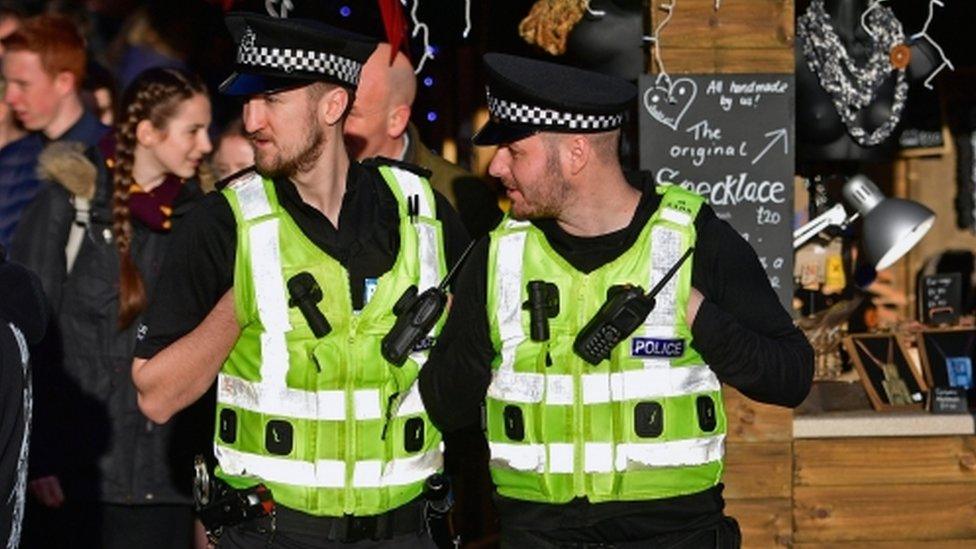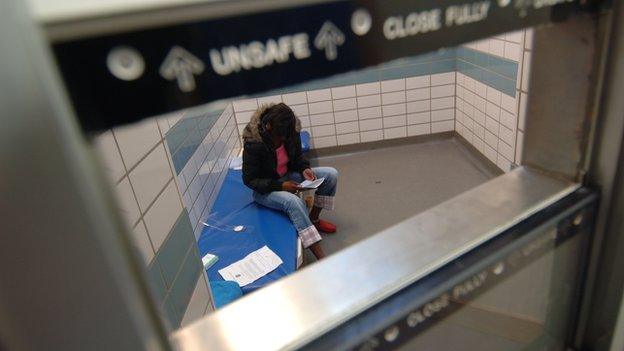'No crime' in 80% of Police Scotland call-outs
- Published

About 80% of incidents attended by police officers do not involve a crime, Police Scotland has told a committee of MSPs.
Assistant Chief Constable Malcolm Graham said officers were called to more than 900,000 incidents last year.
But only about one in five resulted in a crime being recorded.
ACC Graham said many of the non-criminal call-outs involved missing people, mental health incidents or sudden deaths.
In a written submission to Holyrood's justice committee, external, he said non-criminal incidents were placing an increasing demand on police time and resources.
Officers attended more than 42,000 incidents in 2014/15 involving mental health or distress.
A study in West Lothian found officers spend, on average, four hours and 20 minutes dealing with a single incident relating to mental health, self-harm or attempted suicide.
'People in crisis'
ACC Graham also highlighted research indicating that the cost for managing missing-person inquiries in Scotland each year could range from £43m to £80m - the equivalent of 3% to 5% of the annual policing budget.
He wrote: "We know that the demands on our services are changing and that public requirements of policing in Scotland are more complex than just responding to, and preventing, crime.
"While I recognise the often devastating impact that crime has on individuals and communities, the impact of non-criminal incidents is just as evident.
"Many of the most time-consuming incidents relate to concerns for persons, missing/absconded persons and dealing with sudden deaths.
"These calls are often linked to vulnerability and people in crisis; recorded crime alone is therefore not an accurate measure of demand on policing services".
'Difficult circumstances'
He said the force had some successful pilot projects with other organisations to reduce demand on police time and better address the issues involved.
Doctor's organisation BMA Scotland also submitted written evidence to the committee, saying health bodies regularly collaborate with police in cases of people with dementia, those suffering from acute psychotic symptoms, mental health difficulties and personality disorders, as well as those intoxicated with drugs or alcohol.
It said: "Our members say the police do a good job, often in difficult circumstances - often feeling, quite realistically, that they are dealing with things outwith their remit.

Many of the call-outs are to people who have mental health difficulties
"That said, the police do have a role to play and they are very effective in managing an immediate response to people who are in distress or mentally ill, and to people behaving in a way that is violent or could be deemed a threat to the public."
The association warned that any major changes to the current situation would need "major investment in health and social care services".
The justice committee has been examining the demands of non-criminal incidents on police time, and how public bodies and voluntary organisations can work together with the police to ease some of the pressure on officers.
Its meeting on Tuesday morning will feature representatives from Police Scotland and the BMA, as well as Alzheimer Scotland, the Bethany Christian Trust, the Scottish Drugs Forum, Social Work Scotland and the Scottish Police Federation.
A Scottish government spokesman said: "As we have made clear for some time, policing involves more than simply tackling crime and the Scottish Police Authority and Police Scotland are working on a long-term strategy for a flexible, modern and sustainable police service, building on the recently-published strategic police priorities.
"This will ensure sufficient resources and expertise are in place to tackle emerging demands on police time such as cyber-crime and fraud.
"This will mean that the service can continue to help keep the public safe as well as continuing to deal with the significant issue of day-to-day crime."